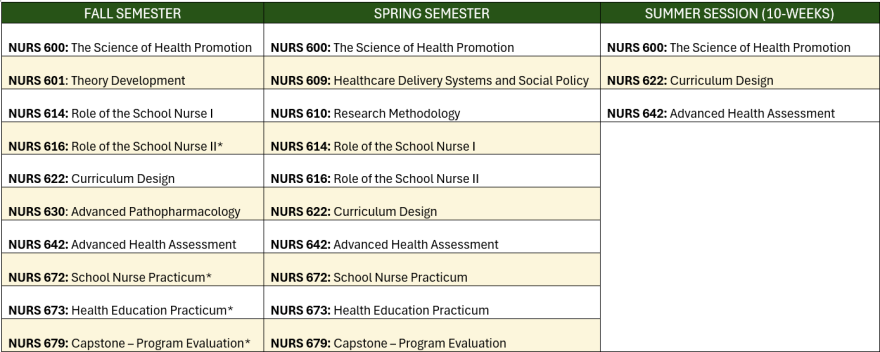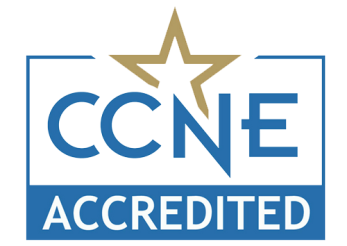Graduate Nursing
Graduate Nursing
About the Program
The Graduate Nursing Program at NJCU is designed to build on nursing baccalaureate education, contemporary nursing practice parameters, and disciplinary competencies.
Our program will provide you with the foundation necessary to advance your professional career while providing flexibility for the working RN through fully online asynchronous and synchronous courses.
At NJCU, we have a proud and long-standing history of preparing nurses for school nursing practice. Our graduate-level nursing programs specialize in preparing our students for school nurse certification in the state of New Jersey. We currently offer two graduate-level programs:
School Nursing
Certificate Program
Learn About our Certificate Program
Master of Science (M.S.) in Nursing
Specialization in School Nursing
Learn About Our Degree Program
Want to learn even more about our programs and get a chance to speak with our program coordinator and graduate admissions? Register for one of our upcoming information sessions (Dates starting October 2024)
Visit the Graduate Nursing Events Webpage today!

All courses within the Graduate School Nurse program are completely online. Courses are taught using the educational platform Blackboard.
Through this platform, students will have access to assignments, discussion boards, messaging (other students, faculty, and staff), syllabi, and the graduate nursing community which will include all necessary resources, important information, updates, and announcements for their time as a student within the program.
The Graduate School Nurse program follows the NJCU Graduate Academic Calendar linked below:
Graduate Academic Calendar | New Jersey City University (njcu.edu).
Fall and Spring semesters follow 13 – 15 Week schedules while Summer courses are 10-week sessions.
While the courses are completely online, lesson modules and assignments are posted weekly through Blackboard and will have assigned due dates.
Following the start of each semester, if a student has not yet submitted assignments, communicated within the course discussion boards, or contacted their instructor to make them aware of personal circumstances, a wellness check email will be sent with a reminder to complete any missing coursework and to communicate with the course instructor.
The program does not follow a set schedule, but there are specific classes that are offered during certain semesters. Below is a table showing current course offerings per semester. Please note that there are no winter session course offerings.

*Pre-requisite Courses: Please be aware of the following:
NURS 616: Pre-requisite course – NURS 614
NURS 672: Pre-requisite courses – NURS 600, 614, 616, 642
NURS 673: Pre-requisite courses – NURS 600, 614, 616, 622, 642
- NURS 672 and 673 can be taken during the same semester if all pre-requisite requirements have been met; it is very challenging taking these two courses together. You can speak with your academic advisor if you are considering this option.
- Enrollment into School Nurse Practicum courses is restricted, and you must apply for and be approved for enrollment by the Program Coordinator or Program Assistant. Additionally, all pre-requiste course requirements must be met before the semester you intend to enroll in a practicum course.
NURS 679: Pre-requisite courses – NURS 600, 601, 609, 610, 614, 616, 622, 630, 642, 672, and 673
- No courses can be taken during the same semester as capstone. All course pre-requisite requirements must be met before seeking approval to be enrolled in the Capstone.
- Enrollment into School Nurse Capstone is restricted, and you must email your academic advisor for permission. apply for and be approved for enrollment by the Program Coordinator or Program Assistant.
Non-Instructional Certification allows you to serve as a school nurse within a New Jersey school district.
Standard Instructional Certification allows you to serve as a school nurse as well as teach health education.
Yes, there are two practicum courses within the program. NURS 672: School Nurse Practicum will earn students their Non-Instructional certification. For students seeking to earn their Instructional Certification, they must also complete NURS 673: Health Education Practicum.
The School Nurse and Health Education Practicum courses (NURS 672 & NURS 673) allow for full-time nurses to complete their Practicum hours at the schools where they are currently employed.
At the time of applying to the Practicum courses, students submit signed workplace request forms and, if accepted for enrollment, have placement contracts completed by their district-level administrators. Full details and instructions are provided weeks in advance of Practicum admission cycles.
You can use the following links for full information about tuition and financial aid:
The Graduate School Nurse program has rolling admission, and you can apply at any time to begin classes at the start of an upcoming semester/session.
For example, if you apply during the Spring, you could begin your classes as early as Summer, or if you apply during the Summer, you could begin in the Fall, etc.
Please be mindful that while we do have rolling admission, course registration becomes available by the university months in advance to the start of an upcoming semester.
Certain courses and semester start terms are more popular than others which means you may find yourself added to course registration waitlists the later you wait to apply for admission to the program.
When applying for the program, it’s possible to select a future semester as your start-date. For example, if you submit an application in Spring, it is possible to choose to apply for a Fall start and be registered for your first class much earlier.
While the NJDOE reviews transcripts for emergency certification and provides recommendations for coursework, the NJCU school nurse program is at the graduate level and the NJDOE evaluation does not always align with our official transcript evaluation process.
Transcripts would need to be evaluated via the NJCU graduate transcript evaluation process upon admission to the Graduate School Nurse program. Unofficial transcripts cannot be evaluated by the Nursing department or program coordinator. Only official transcripts submitted with a completed application to Graduate Admissions can be reviewed. Some BSN programs are bridge to MSN programs and include 500 and/or 600-level courses.
If you have 500/600-level courses on your Master’s transcript from an ACEN or CCNE accredited program (institution must be regionally accredited) with an earned grade of “B” or above, those courses may be evaluated for course equivalent/transfer credit.
Undergraduate courses will not be reviewed for course equivalent or transfer credit as the School Nurse program at NJCU is a Graduate-level program.
Take Health Care to School!
- Serve an essential role in assuring healthy equity and academic success for all children
- Bridge the gap between health and education, ensuring that all children, regardless of their health, economic, or social status, have an opportunity for optimum wellness and educational achievement
- Provide health services, coordinate care for students with chronic or acute health conditions to minimize disruptions in learning, perform health screenings, conduct disease surveillance, and connect families with needed services.
Contact Us for More Information
Andrea Squillante
School Nurse Program Assistant
Office: Rossey Hall 405
Email: asquillantegolden@njcu.edu
Phone: 201-200-3157
General Inquiries
SchoolNurse@njcu.edu
(201) 200-3157
Commission on Collegiate Nursing Education
The baccalaureate degree program in nursing and the master's degree program in nursing at New Jersey City University are accredited by the Commission on Collegiate Nursing Education, 655 K Street NW, Suite 750, Washington, DC 20001, 202-887-6791.
The MS Program is accredited until December 31, 2032. This accreditation action was made effective March 28, 2022.
New Jersey Department of Education
The School Nurse Certificate Program is approved by the New Jersey Department of Education (NJDOE). Program completers who meet all program and State certification requirements will be eligible for the appropriate school nurse instructional or non-instructional certifications.
- Full-online program with asynchronous and synchronous course options
- The program is designed for adult learners
- A Comprehensive and challenging curriculum
- NJCU's culturally diverse faculty possess excellent teaching and academic credentials, including school nurse certification
- Affordable tuition rates
- Seamless learning experiences
- Professional growth opportunities to support nurses’ career trajectories
Students who complete the Master of Science in Nursing with a Specialization in School Nursing Program at NJCU will be able to:
- Engage in the processes of scholarship, critical thinking, communication, and research for practice and advanced study.
- Employ information systems technology and inter-professional collaboration to manage and transform clinical and educational practice.
- Evaluate socioeconomic and healthcare policy issues and trends that affect advanced practice and nursing education.
- Provide leadership to promote effective change in health care delivery systems and nursing education through the integration of advanced nursing knowledge, theories, and principles for effective outcomes.
- Design population-centered and culturally responsive strategies in the delivery of clinical and educational practice.
- Assimilate the role of the school nurse in schools and communities with diverse populations.
- Demonstrate competencies in using evidence-based practice to design, implement, and evaluate nursing services and health education curricula in schools and communities
